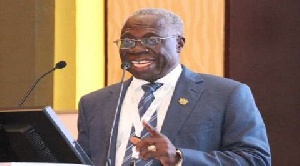In creating a Ghanaian-owned economy, there is the need for a mindset change in the public sector, where its energies would have to be consciously geared towards assisting the private sector to grow and create much-needed jobs, Senior Minister, Yaw Osafo Maafo, has said.
“My idea of restructuring of the economy should bear one fact: that the public sector should work in the interest of the private sector for the economy to grow and become prosperous,” he said on the opening day of B&FT’s flagship Ghana Economic Forum, yesterday.
“You should change your mind to assist the private sector to make the money. That is the only way we can grow this economy,” the Senior Minister said to a public sector that is often accused of behaving as if its interests and those of the private sector are in conflict.
“Today, we have a programme with the IMF. The public sector is full in terms of employment; we can’t employ people. Perhaps, we have to even lay some off,” the minister said, adding that the only way out is for the private sector to be assisted to create the jobs.
“In 2005, when I was Minister of Education, we had eight universities – six public and two private ones. Today, as I speak, and you are aware that most of the polytechnics have been converted to universities, we have about 20 universities in the public sector and about 75 universities in the private sector. You ask yourself: where will the products of these almost 100 universities be working? They will only find jobs if the private sector grows, if the private sector expands and if the private sector becomes prosperous. And if we do not get our mindset in this direction, we are heading for trouble as a country,” he said
Data from the Institute of Statistics, Social and Economic Research (ISSER) of the University of Ghana, has revealed that only 10 per cent of graduates find jobs after their first year of completing school.
The institute estimates that some 60,000 students graduate from tertiary institutions across the country each year.
Whilst the public sector has frozen employment due to the huge wage bill on government’s neck, alongside other macroeconomic difficulties, the private sector has not been able to expand to absolve as many graduates as possible, leading to high unemployment in the country.
For the economy to be brought back on a sounder footing, and for it to create jobs for the youth, the Senior Minister said the government has decided to focus on four sectors: macroeconomic stability, debt sustainability, agricultural transformation and infrastructure development especially so far as energy is concerned.
And to create a Ghanaian-owned economy, he said the country’s laws must support Ghanaians in the private sector to play a lead role even as a “helping hand” would be needed from foreign investment.
“Our laws should, together with captains of industry, make sure that the Ghanaian is in the steering wheel, directing…we have to be thinking along these lines,” he said.
General News of Tuesday, 8 August 2017
Source: kasapafmonline.com













